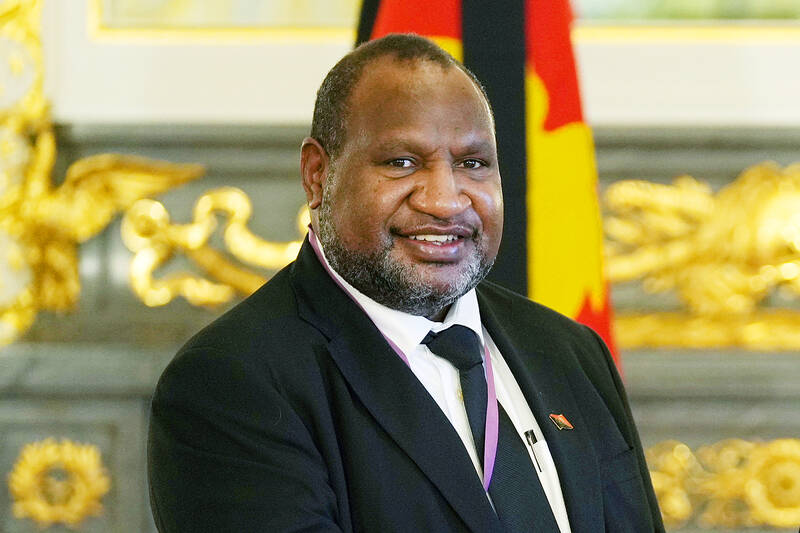Papua New Guinea (PNG) said that a proposed security treaty with Australia would be delayed as it consults “domestic processes,” a week after signing a defense agreement with the US that sparked student protests.
Papua New Guinea, a few kilometers to Australia’s north, is being courted by China and the US amid rising tensions between the two major powers.
Washington and its allies are concerned about Beijing’s security ambitions in the strategically located Pacific islands region, after Beijing struck a security pact with Solomon Islands.

Photo: AP
PNG Prime Minister James Marape met with Australian Minister for Defence Richard Marles on Monday on the sidelines of the Korea-Pacific Islands Summit in Seoul and discussed the “proposed bilateral security treaty”, Marape’s office said in a statement yesterday.
“It is a work in progress and requires the PNG side to consult our domestic processes and sovereign laws in relation to certain wordings and provisions,” the statement said.
Marape had “conveyed his apologies to [Australian] Prime Minister Anthony Albanese for the delay in formalizing this proposed treaty with Australia,” it said.
Negotiations with Australia on upgrading defense ties to a security treaty — which would need to be ratified by parliament — had been expected to be finished by last month, Marape and Albanese said in a joint statement in January.
Australia is PNG’s biggest aid donor and Marape’s government last year sought to upgrade a defense cooperation agreement.
Marles has said Australia wants to strike an “ambitious” security treaty that will see navy, air force and army personnel from each nation working alongside each other more often.
PNG’s defense ties have come under intense domestic political scrutiny in the past week after the US agreement was signed during a visit by US Secretary of State Antony Blinken.
STRATEGIC RIVALRY
The deal was criticized by opposition politicians who said it could embroil PNG in strategic competition between the US and China.
The Chinese navy has been deploying ships near Australia twice a year, including in northern waters and its exclusive economic zone, Australian Chief of Defence Force Angus Campbell told an Australian parliament hearing yesterday.
Chinese navy ships have traveled down Australia’s east and west coasts, across its south returning from the Indian Ocean, and monitored major Australian navy exercises, he said.
“We are seeing a gradual increase in rate of presence from the PLA Navy,” said Hugh Jeffrey, deputy secretary of the Australian Department of Defence.
In related news, South Korea and Australia’s defense chiefs yesterday agreed to step up defense cooperation, the South Korean Ministry of National Defense said.
Korean Minister of National Defense Lee Jong-sup met Marles on the sidelines of the summit in Seoul.
Lee expressed the South Korean military’s willingness to join the Indo-Pacific Endeavour, an Australian-led multinational military drill, as well as Operation Render Safe, activities by the Australian Defense Force to remove underwater mines in the Pacific.
The two countries agreed to hold working-level meetings as part of steps to revise a memorandum of understanding signed in 2011 aimed at enhancing defense industry cooperation.
Marles also met with South Korean President Yoon Suk-yeol and discussed joint efforts to expand cooperation with the Pacific island countries, a presidential spokesperson said.

Former Nicaraguan president Violeta Chamorro, who brought peace to Nicaragua after years of war and was the first woman elected president in the Americas, died on Saturday at the age of 95, her family said. Chamorro, who ruled the poor Central American country from 1990 to 1997, “died in peace, surrounded by the affection and love of her children,” said a statement issued by her four children. As president, Chamorro ended a civil war that had raged for much of the 1980s as US-backed rebels known as the “Contras” fought the leftist Sandinista government. That conflict made Nicaragua one of

COMPETITION: The US and Russia make up about 90 percent of the world stockpile and are adding new versions, while China’s nuclear force is steadily rising, SIPRI said Most of the world’s nuclear-armed states continued to modernize their arsenals last year, setting the stage for a new nuclear arms race, the Stockholm International Peace Research Institute (SIPRI) said yesterday. Nuclear powers including the US and Russia — which account for about 90 percent of the world’s stockpile — had spent time last year “upgrading existing weapons and adding newer versions,” researchers said. Since the end of the Cold War, old warheads have generally been dismantled quicker than new ones have been deployed, resulting in a decrease in the overall number of warheads. However, SIPRI said that the trend was likely

BOMBARDMENT: Moscow sent more than 440 drones and 32 missiles, Volodymyr Zelenskiy said, in ‘one of the most terrifying strikes’ on the capital in recent months A nighttime Russian missile and drone bombardment of Ukraine killed at least 15 people and injured 116 while they slept in their homes, local officials said yesterday, with the main barrage centering on the capital, Kyiv. Kyiv City Military Administration head Tymur Tkachenko said 14 people were killed and 99 were injured as explosions echoed across the city for hours during the night. The bombardment demolished a nine-story residential building, destroying dozens of apartments. Emergency workers were at the scene to rescue people from under the rubble. Russia flung more than 440 drones and 32 missiles at Ukraine, Ukrainian President Volodymyr Zelenskiy

Indian Prime Minister Narendra Modi is to visit Canada next week, his first since relations plummeted after the assassination of a Canadian Sikh separatist in Vancouver, triggering diplomatic expulsions and hitting trade. Analysts hope it is a step toward repairing ties that soured in 2023, after then-Canadian prime minister Justin Trudeau pointed the finger at New Delhi’s involvement in murdering Hardeep Singh Nijjar, claims India furiously denied. An invitation extended by new Canadian Prime Minister Mark Carney to Modi to attend the G7 leaders summit in Canada offers a chance to “reset” relations, former Indian diplomat Harsh Vardhan Shringla said. “This is a